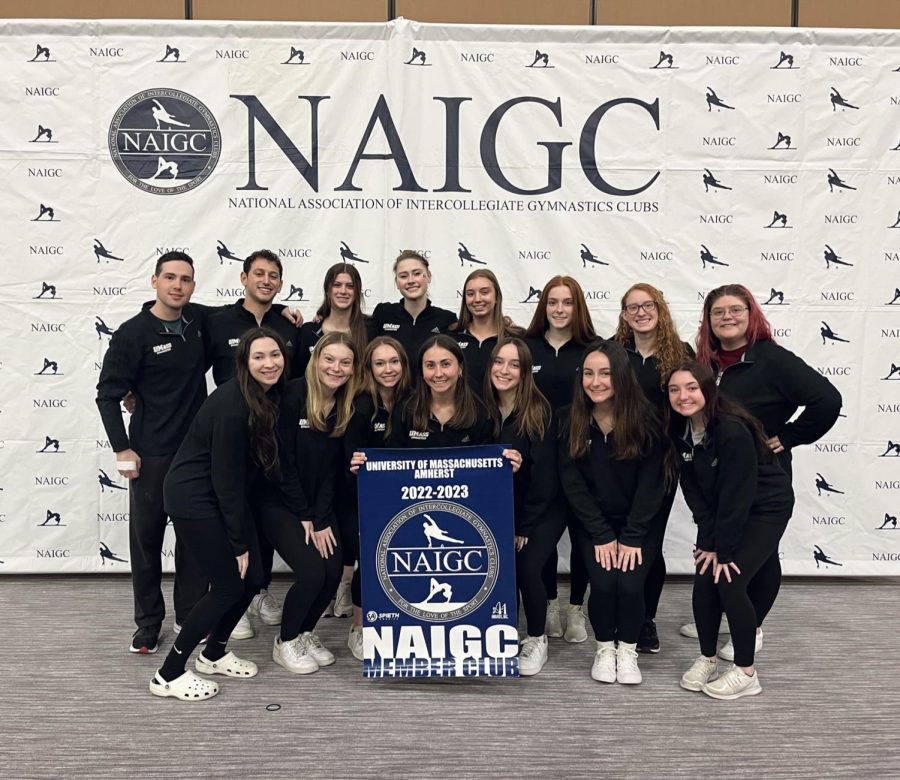The last time the University of Massachusetts men and women’s gymnastics teams were allowed to compete in NCAA Division 1 competitions was 2002. 21 years later, as a club, they finally competed at the NAIGC (National Association of Intercollegiate Gymnastics Clubs) level at a national tournament in Memphis, Tenn.
According to the Campus Chronicle, seven UMass D1 teams were cut from the athletic department. Former Chancellor Marcellette G. Williams and former athletic director Robert Marcum defined that the cuts would allow the reallocation of some scholarship funds while also following Title IX guidelines.
What determined the ultimate cut of the teams were several factors, including the national and regional health of the sport, Title IX participation considerations, facilities issues, in-state versus out-of-state participation and the financial resources required to bring the sports to a more competitive level. The most defining criteria that outweighed the other factors listed were the win-loss records and post-season success.
Students, 21 years later, still feel the effects of this decision. Olivia Mooradian, a junior biology and German major who has been on the team since her sophomore year, expressed how it is a dying collegiate sport. She noted that taking the sport away from those who would like to compete only adds to its demise.
“Everyone only really thinks about it every four years when it comes down to the Olympics … and besides that it’s kind of … out of sight out of mind,” she said.
When the team was disbanded, all of the equipment was sold. This left current team members, such as freshman kinesiology major Mina Kiefer frustrated. Kiefer said that the club and recreational members could have used the equipment for their own practices, but now need to make a 30-minute commute and return late at night.
The team has four open gym practice times that they can attend – Mondays, Wednesdays and Sundays at the Greenfield YMCA. Monday and Wednesday practices are from 8:00 p.m. to 10:30 p.m., while Sunday practices are from 4:00 p.m. to 6:30 p.m. Saturday practices are held at Western Mass Gymnastics in Agawam from 12:00 p.m. to 4:00 p.m.
Vice President Brian Ungar, a senior kinesiology major who joined the team his freshman year, said that equipment management also ties in with fundraising difficulties. Currently, the team is trying to donate a new pommel horse to Western Mass Gymnastics, owned by Darren Morace and former American Olympian gymnast Tim Daggett as they allow the team to use the facilities for free.
“If we get equipment, [the athletic department only wants] UMass students on it. The whole point is that we’re gifting them like a pommel horse for [Western Mass Gymnastics] to use, which we would also use if we wanted to,” Ungar said.
Despite these circumstances, the team still manages to compete. From March 29 to April 1, UMass club gymnastics competed at the NAIGC level at Nationals in Memphis, Tenn. 15 gymnasts represented UMass Amherst. Daniel Barskiy placed first in vault and second in rings at level nine, while Heather Volkin and Hannah Steinbrecher medaled in synchronized trampoline at the new flyers level.
Barskiy, a senior computer science major and club president, said that going to Nationals was a surreal moment and big achievement for the club.
“I’ve been on the e-board since my freshman year, and […] our goal for a while was to get to Nationals … It was awesome to kind of finally achieve the goal that we set as a club in 2019, almost four years ago,” he said.
To make it to Nationals, the team trains and compete in smaller meets. Since the team does not compete as often as a regular collegiate team, they do not have the same amenities as one, such as the club not having a coach.
Lily Thompson, a sophomore kinesiology major who joined the team her freshman year, says that the self-run practices benefit the club and its members, especially to those who are not looking to compete and solely want to work on new skills.
“You can choose when you want to go and kind of work at your own pace,” Thompson said.
Freshman Sophia Mola praises this open attitude on the team. Compared to the competition and practice season during many athletes’ high school years, the club offers a place for gymnasts to work on the skills they love without the stress and anxiety of moving up in levels.
Mola said that many of gymnasts struggle with overcoming mental blocks when they are stressed in competition seasons, as gymnasts are required to learn new skills to rise in the competition levels.
“It’s always gonna be there, that whole mental block [mindset], but it takes time and you eventually learn to work around it,” Mola said.
Several athletes have noticed that being with teammates helps relieve mental blocks. As the team grows, so does their bond. Many of them major in similar fields and work together while others enjoy similar events. These bonds make the team stronger and more enjoyable to be a part of.
“It’s nice to just have your small little family community that you can go to every day, especially after classes all day, ” senior nutrition and health sciences major Autumn Hines said.
Kalina Kornacki can be reached at [email protected] or followed on Twitter @KalinaKornacki.




















